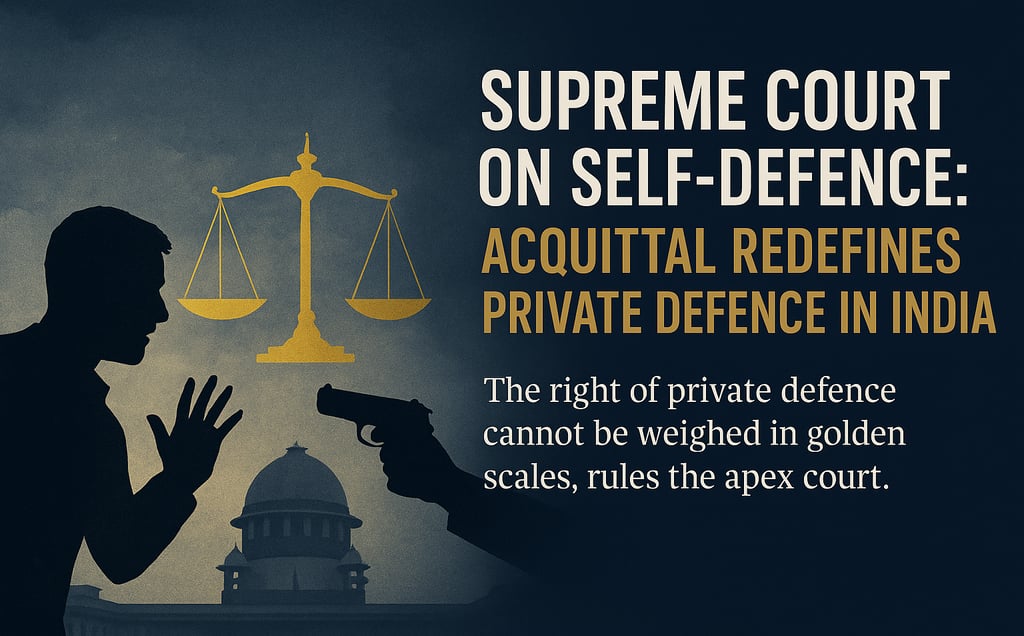Supreme Court on Right of Private Defence: Doctor Acquitted in Landmark Ruling
The Supreme Court of India has acquitted a doctor accused of murder, holding that the right of private defence cannot be weighed in golden scales. Read about this landmark Supreme Court private defence ruling and its impact on criminal law in India.
Adv. Sachin Gupta
9/13/20253 min read


Supreme Court’s Game-Changing Ruling: Can Self-Defence Justify Taking a Life?
In a dramatic turn, the Supreme Court of India has acquitted a Uttarakhand doctor who shot and killed a man that attacked him with a pistol inside his clinic. The Court’s ruling, which relied heavily on long-standing principles of the right of private defence, sparks a crucial debate: How far can an individual go to protect themselves when faced with imminent danger?
At the heart of this case lies a chilling question—when a gun is pointed at you, do you have the luxury of calmly measuring your defensive response?
The Case: When Survival Meets Law
The case stems from a violent altercation between Dr. Rakesh Dutt Sharma and a man with whom he had a financial dispute. The man allegedly entered Sharma’s clinic armed with a pistol and even fired at him. In the chaos, Sharma managed to snatch the weapon and shot the attacker, who later died.
The trial court and the Uttarakhand High Court both convicted Sharma under Section 304 Part I of the IPC, sentencing him to life imprisonment. Their reasoning? That Sharma had allegedly “exceeded” his right to private defence by aiming at vital parts of the attacker’s body.
But the Supreme Court disagreed.
Supreme Court’s Stand: Self-Defence Is Not Mathematics
A bench comprising Justice MM Sundresh and Justice N Kotiswar emphatically ruled that the right of private defence cannot be weighed in golden scales. In other words, when a person is under armed attack, they cannot be expected to respond with mathematical precision or clinical restraint.
The Court drew upon its earlier precedent in Darshan Singh v. State of Punjab (2010), where it laid down 10 guiding principles on private defence, including:
Self-preservation is a natural instinct recognized by criminal law.
A person under attack is not required to wait until harm is inflicted—reasonable apprehension of danger is enough.
The right to private defence begins the moment such apprehension arises and lasts until it ceases.
The force used need not be perfectly proportional—it just should not be wholly excessive.
Courts must assess situations from the lens of a reasonable person in that moment, not through hindsight.
Applying these principles, the Supreme Court acquitted Sharma, holding that his actions fell squarely within the scope of private defence under the Indian Penal Code.
Why This Ruling Matters
This judgment is a watershed moment in Indian criminal jurisprudence. It acknowledges the reality of human instinct under threat—when bullets fly, it is unreasonable to expect calm calculations.
For citizens, the ruling reinforces that:
Self-defence is a legitimate legal right, not a privilege.
Courts will examine self-defence claims with a humane, realistic approach.
Victims of sudden armed attacks are not required to act with surgical precision.
For legal practitioners, the judgment clarifies that courts should not dismiss self-defence claims simply because the response appears disproportionate when analyzed later in a courtroom.
Broader Implications: Drawing the Line
Yet, the ruling also raises important questions. What happens if accused persons begin to overuse “private defence” as a shield in violent encounters? How will courts balance genuine self-preservation with misuse of this defence?
The Court has made it clear: while private defence is not unlimited, its boundaries will be judged through the eyes of a reasonable person in fear for their life, not by detached hindsight.
This delicate balance—between preventing misuse and ensuring justice for those who truly defend themselves—will shape many future trials.
Final Word: A Turning Point in Self-Defence Jurisprudence
The Supreme Court’s private defence ruling in Rakesh Dutt Sharma v. State of Uttarakhand is more than just an acquittal; it is a reaffirmation of the fundamental instinct to survive. By ruling that self-defence cannot be measured in perfect scales, the Court has humanized criminal law, making it responsive to real-life dangers.
The bigger question remains: Will this ruling embolden more individuals to assert the right of private defence in India’s courts? Only time will tell.
Altius Astra Attorneys
A premier law firm based in Delhi, India, offering legal representation across various practice areas for citizens rights and interests.
© 2025. Altius Astra Attorneys. All rights reserved.
Contact Us
📞 9899290789, 9818786756
📧 contact@altiusastra.com
3C-ED Block, Madhuban Chowk, Pitampura, Delhi-110034
DISCLAIMER
